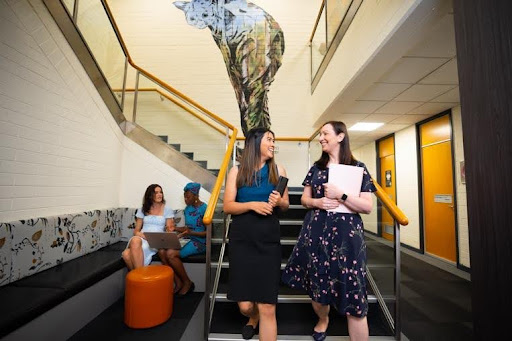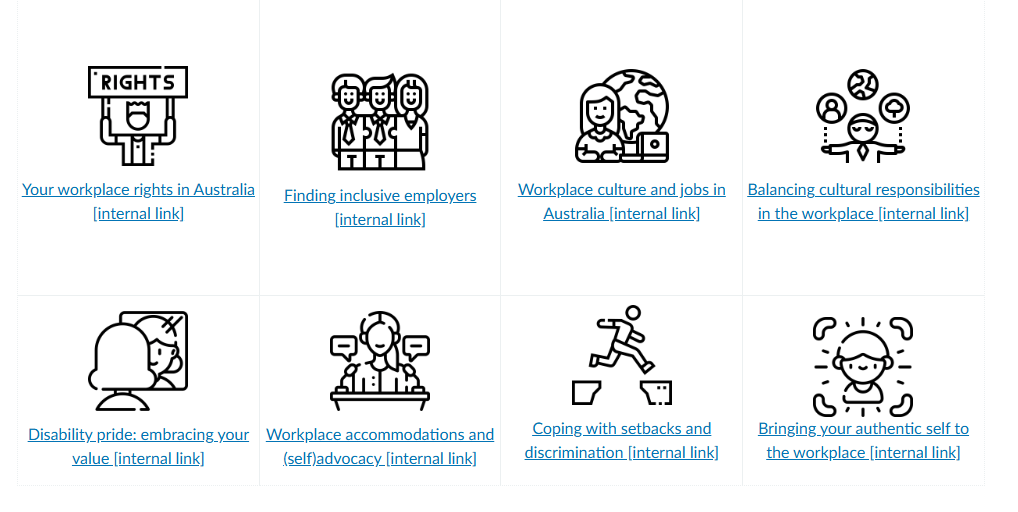
Harnessing the power of diverse lived experiences to create inclusive career journeys for ECU students

The Employability Team is harnessing the power of diverse lived experiences to create inclusive career journeys for ECU students.
What is the Inclusive Employability Initiative?
The ECU Employability Project’s Inclusive Employability initiative aims to improve employability outcomes for students with diverse lived experiences. The goal is improving the career readiness of students through a range of curricular, extracurricular and work-based activities.
Why is This Important?
ECU students are diverse! There is a rich and vibrant tapestry of intersecting lived experiences, encompassing different cultures, nationalities, languages, gender, sexuality, neurodiversity, disabilities, socio-economic status, religion, age, and more. A summary of key facts and figures is available through ECU’s Strategic and Governance Services.
Over the past two decades, Australian universities have actively encouraged and implemented policies to encourage wider participation in higher education. Despite this, research shows that improving access to higher education for students from equity groups has not correlated to the same improvements in post-graduate employment (Pitman et al., 2019). This is also evidenced by the QILT Graduate Outcomes Survey results for undergraduate employment outcomes in 2023, which reflect differences in employment outcomes of 8.9% or more for students with “reported disability” and “language other than English”.
Background and Key Principles Guiding This Project
The Employability Project was initiated to support the ECU Strategic Goal of ‘delivering an exceptional student experience for success in work and life,’ (ECU strategic plan 2022-2026) with specific objectives 1.2 ‘improve graduate outcomes for students from equity groups’ and 1.4 to ‘increase access and participation for students from equity groups’.
Project activities include an intentional and purposeful focus on ensuring career development and employment learning opportunities are accessible, fair, and supportive of all students, and embrace diversity. We call it inclusive employability.
The inclusive employability approach is guided by universal design principles and co-design principles to create meaningful relationships with students (Matthews et al., 2018) and collaboration between students, the university, and employers.
Who Benefits?
Inclusive employability benefits ECU students, employers, and the broader community.

Students
Students can unlock their unique skills and strengths through diversity, through inclusion in flexible work-integrated learning options, workplace adjustments, and career development learning that addresses diversity as the foundation of the student’s successful employability journey.

Employers
Employers can unlock untapped talent pools in an increasingly tight graduate market. By implementing inclusive employment pathways, organisations can benefit by:
• Improving innovation
• Increasing diversity of perspective to drive excellence
• Creating positive and respectful workplace cultures
• Delivering economic outcomes and fit-for-purpose outputs through a more representative workforce
Project Outputs and Goals
The first project outputs delivered in 2024 focused on co-designing and developing curricular inclusive employability resources with ECU students.
An institution-wide consultation process framed the brief, including consultation with the following stakeholder groups throughout the project.
Figure 1: The inclusive employability stakeholder triad
Core goals arising from the consultation process include:
- Centre student and graduate voice and experiences: facilitate self-empowerment and agency of students through incorporation of authentic lived experiences.
- Positive visibility of diverse lived experiences: create inclusion as ‘business as usual’ for processes and environments.
- Student readiness: curricular career development resources recognising diversity of lived experience to support students to become aware of their own strengths and requirements for inclusive employment.

The result was ‘Strength in Diversity: Enhancing your employment journey’; an ECU Canvas course site featuring real-life graduate and student stories from the workplace, designed to support students with diverse and intersectional lived experiences.
By including diverse perspectives in the planning, development and production stages, the resulting outputs are robustly tested so they are relevant, accessible and meaningful to their intended audience.
Figure 2: A visual of the topics available in the ‘Strength in Diversity: Enhancing your employment journey’ resource.
Next Steps and Collaboration Opportunities
Building inclusion and equity of opportunity through work-based WIL programs, including:
- Inclusive WIL policy
- Training and resources for ECU WIL coordinators and workplace supervisors
- Creation of inclusive WIL opportunities with employers
Co-designing and developing inclusive career pathway programs with employers and industry peak bodies.
Building on partnerships and communities of practice across multiple ECU schools to develop a connected whole-of-institution approach.
References
Matthews, K.E., Dwyer, A., Hine, L. et al. (2018). Conceptions of students as partners. High Educ 76, 957–971. https://doi.org/10.1007/s10734-018-0257-y
Pitman, T., Roberts, L., Bennett, D., & Richardson, S. (2019). An Australian study of graduate outcomes for disadvantaged students. Journal of Further and Higher Education, 43(1), 45-57. https://doi.org/10.1080/0309877X.2017.1349895
Related Articles
Explore related articles and stay informed on the latest in Learning and Teaching at ECU.